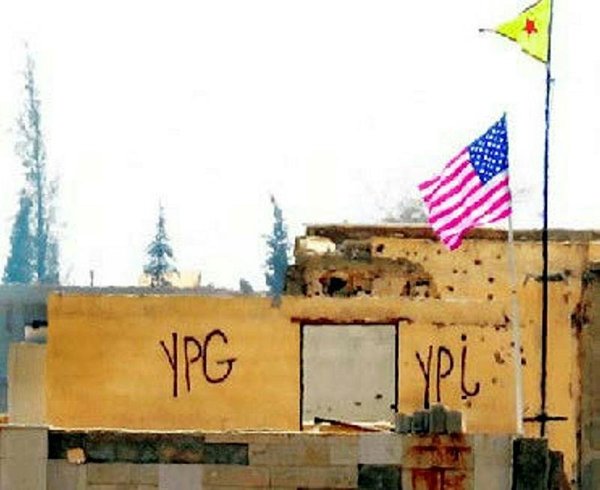The United States is apparently in default of its obligations under Articles 3 and 5 of the NATO treaty by supporting the PYD/YPG terrorist groups in the fight against Daesh in war-torn Syria.
Article 3 of the NATO charter states: "In order more effectively to achieve the objectives of this Treaty, the Parties, separately and jointly, by means of continuous and effective self-help and mutual aid, will maintain and develop their individual and collective capacity to resist armed attack."
Article 5, asserting the principle of collective defense, says: "The Parties agree that an armed attack against one or more of them … shall be considered an attack against them all and consequently they agree that, if such an armed attack occurs, each of them, in exercise of the right of individual or collective self-defence recognised by Article 51 of the Charter of the United Nations, will assist the Party or Parties so attacked by taking forthwith, individually and in concert with the other Parties, such action as it deems necessary, including the use of armed force..."

However, the U.S. giving supplies to the terrorist PKK and its PYD/YPG offshoots helped the terror group spread across one-fifth of Syria, thus posing a major threat to Turkey.
Especially over the last two years, the U.S., which has increased its military support for the PKK's Syrian affiliates, caused the group to occupy a large area in the guise of fighting Daesh.
This failure to meet its obligations under Article 3 and 5 calls into question the U.S.' loyalty to NATO's central purpose, namely that an armed attack against one NATO ally will be considered an attack against them all.
The PKK is listed as a terrorist group by Turkey, the U.S., and the EU, and Turkey also considers its Syrian offshoot the PKK/PYD a terror group. However, the U.S. has called the PYD a key ally in the fight against Daesh in Syria.
Turkey has repeatedly called for the U.S. to end its support for the PKK/PYD.
SDF FIG LEAF SUPPORT FOR PKK/PYD IN SYRİA
The formation of the Syrian Democratic Forces (SDF) more than a year ago has also provided the U.S. with the opportunity to deepen its relationship with the PKK/PYD, according to security officials in Turkey and Syria.
The SDF was formed in October 2015 when the PKK/PYD incorporated several fighting groups.
Many view the umbrella group as a fig leaf to disguise U.S. support for the PKK/PYD. The Pentagon said last week that U.S. forces operate "in close proximity with" SDF fighters in northern Syria, including near the Turkish border.
According to officials in Turkey and Syria who spoke to Anadolu Agency on condition of anonymity due to restrictions on talking to the media, the PKK/PYD makes up the upper echelons of the SDF and the bulk of its fighting force.
Images from Syria shared on social media often show militants wearing SDF and PKK/PYD insignias fighting alongside each other.
One source said the PKK/PYD had established more than 30 camps in Syria's Al-Hasakah, Afrin and Kobani regions under the Syrian Defense Forces banner.
US WEAPONS IN PKK HANDS
According to Turkish security officials who asked not to be named due to restrictions on speaking to the media, the explosives and weapons the U.S. provides to the PYD in Syria are used by PKK in terrorist attacks in Turkey.
An April 11 bomb attack on a police compound in the southeastern province of Diyarbakir was carried out using explosives the U.S. supplied to the PKK/PYD in Syria, the official claimed.
Three people were killed in the attack, for which the PKK claimed responsibility. The local governor said at the time that 1 ton of explosives was placed in a tunnel under the compound.
The official also claimed that weapons the U.S. supplied to the PKK/PYD had also been found in PKK camps.
The U.S.-provided weapons, which the source said included ammunition, anti-tank rockets, and assault rifles as well as explosives, crossed into Turkey from Sinjar, northern Iraq and Syria's Karacok region.
Both areas were struck by Turkish warplanes on Tuesday, in attacks that drew criticism from Washington and led to the deaths of up to six Iraqi Peshmerga -- troops belonging to the Ankara-allied Kurdish Regional Government.
As well as citing the Diyarbakir attack, the official said the weapons had been used in other attacks on security forces across Turkey.
In April 2016, the U.S. ambassador to Ankara denied arming the PKK/PYD and said any U.S. weapons found in PKK hands would have ultimately come from Iraqi security forces.
Since the PKK launched its terror campaign in 1984, an estimated 40,000 people in Turkey have died in related violence.
The PKK resumed fighting in July 2015, since when it has been responsible for the deaths of approximately 1,200 security personnel and civilians, according to an official tally.